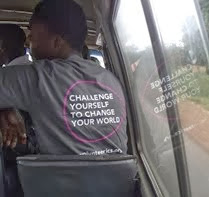I was sitting in a newly furnished office of a local NGO Project
Agape with volunteers and programme supervisors. A Chief Nursing Officer (CNO)
from a nearby hospital was speaking. She was captivating and her story unreal. Words
like early child marriage, forced,
difficulties in pregnancy, fistula, death, discrimination filled the room.
Words I had read about in Half the Sky and with my own mother and grandmother married off at an early age in Nepal, I knew that child marriage persisted around the globe. But that didn’t make it any easier. Every story the CNO told from her time in a hospital in Kano, a Northern Nigerian state, started and ended in the same way. A child as young as 8 years old would be married off to men twice, even three times their age. She would have to leave her school, her home and her friends and become a wife and take on responsibilities far beyond her age.
Words I had read about in Half the Sky and with my own mother and grandmother married off at an early age in Nepal, I knew that child marriage persisted around the globe. But that didn’t make it any easier. Every story the CNO told from her time in a hospital in Kano, a Northern Nigerian state, started and ended in the same way. A child as young as 8 years old would be married off to men twice, even three times their age. She would have to leave her school, her home and her friends and become a wife and take on responsibilities far beyond her age.
Sexual relationship after marriage is expected even when
the partner a grown man is having sex with is a young girl of age 8. The child
would end up having sexual intercourse before she was physiologically or intellectually
capable of understanding the word sex. If a girl becomes pregnant, risks to her
health and that of the unborn baby increases dramatically because, one, her
body is not yet fully developed to carry a baby. Secondly,
the practice of traditional midwives
especially in the Northern parts of Nigeria who rely on their experience of
delivering babies rather than science means that when complication arises, the
traditional midwife will not have the
knowledge nor skills to perform lifesaving interventions quickly. And, because
of people’s unwavering faith in their traditional midwives, the husband is less likely to take the pregnant girl to
the hospital until the situation becomes desperate; when the labour is already obstructed.
Due
to obstructed labour, girls often suffer from obstetric fistula. Obstetric
fistula is a hole in the birth canal. When a baby’s head is stuck in the
birth canal, pressure causes tissues between the vagina and bladder or rectum to
be damaged. The dead tissue leaves a hole through which urine or faeces drips
out and it often
leads to skin infections, kidney disorders and even death if left untreated.
It is vital to remember that young girls who are often
married do not have the capacity to give informed consent. It is often the case
that the decision to marry will be decided by her father or family members and
she will have little say in it. Even if a girl agreed to get married, she is
not yet emotionally mentally developed to understand what it means to get
married and the impact it will have on her life.
Giving birth is an enormous step that requires physical,
emotional and mental strength but when a child is giving birth to another
child, the experience can have a lasting impact especially if child birth leads
to obstetric fistula. Obstetric fistula reaches far beyond its physical scars.
Due to incontinence of urine and or faeces, girls face stigma and discrimination from their husbands, family and society. Many girls
are divorced by their husbands before they even have the time to recover from
these conditions. Still coming into terms with their health, these girls are
often illiterate, young mothers and divorced with no source of income or
livelihood, and to add salt to the wound, deemed an unfit by their society. Which is why, to learn that depression and
suicides were commonly found among young girls, did not surprise me.
For the man, life
goes on, in fact it’s even better. Since he is a man, he has the means to marry another bride, usually a child, pay
his bride price and continue enjoying his life. His young ex-wife is not
literate or empowered enough to ask for any support nor does he see he should.
Nigeria is not alone in its notoriety of child marriages, in
fact, it is said to be practiced mostly in the Northern states of the country
where the dominant religion is Islam. According to the United Nations statistics
Niger has the highest percentage of girls married before they turn 18 whereas Nepal
ranks number 19 with 41% of child marriages.
I remember my mother
telling me how her own mother was totally oblivious to the fact that she was
married. She was a child and to her, the marriage ceremony a play. Children
deserve and have the right to be a child. Children are the leaders of tomorrow
but how can we expect them to lead our families, societies and our countries if
we keep depriving them from their right to live, to choose, to have a good
education, healthy life and protection?
Let’s stop using the excuse of culture, tradition and
religion to ruin the lives of children.
Laxmi Gurung
UK volunteer







0 comments:
Post a Comment